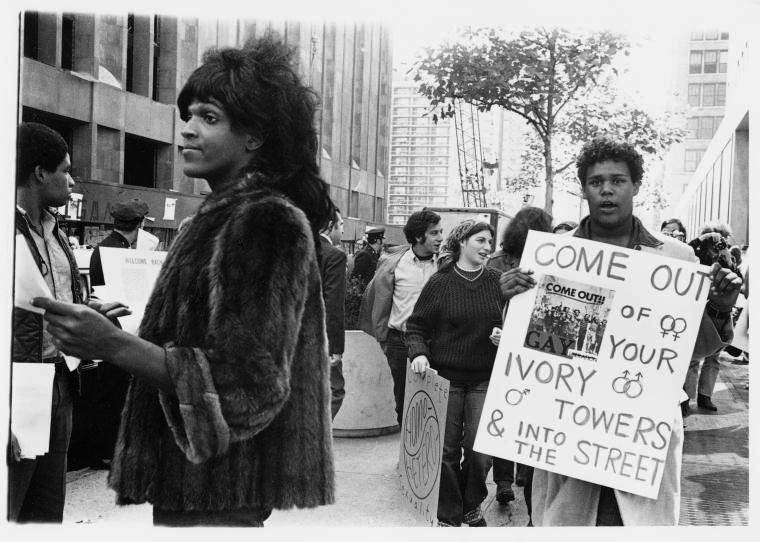Hey Mama, Welcome (Back) to the ’60s
The photo depicts Marsha P. Johnson, an African-American gay liberation activist, handing out flyers in support of queer students at NYU outside of Weinstein Residence Hall in 1970.
January 30, 2018
You say you want a revolution? Well, the counterculture movement is back, alive and well in Gottesman Exhibition Hall at the New York Public Library. The exhibit, “You Say You Want a Revolution: Remembering the 60s,” focuses on the various social movements of the ’60s.
Tensions surrounding race, politics and sex are captured through various mediums of art from the library’s permanent collection, including footage from Woodstock, Timothy Leary’s notes on acid trips and the Stonewall Riots of 1969.
One significant facet of the exhibit was the then-youth’s reactions to the escalating conflict in Vietnam. Posters defacing former president Richard Nixon, whose foreign policy during the Vietnam conflict was considered impulsive and “madman-like” when he threatened other countries with nukes. Another piece pastiched the iconic “I Want You” sign, picturing a bandaged Uncle Sam reaching out toward the viewer with the words “I Want Out.” This particular piece revealed the deeply rooted patriotism of the United States that is still alive today.
Some areas of “You Say You Want a Revolution” focused on the Civil Rights Movement, where portraits of civil rights trail blazers Martin Luther King Jr. and Malcolm X were championed. Other pieces focused on the drug epidemic and the hippie’s inclination to psychedelics. One piece representative of this humorously placed Goofy, Mickey Mouse and Donald Duck together with oversaturated colors and fuzzy lines as the friends trip together.
Timely highlights of the exhibit, and of the ‘60s in general, show the era’s increasing desire to connect with nature. The work of Henry David Thoreau and other transcendentalists, who often retreated to a simple life immersed in nature, were displayed side by side.
Another highlight was the significant weight placed on gender and sexuality in the exhibit, specifically the plight of women and the LGBTQ community in the ’60s. Better yet, many protests surrounding these topics happened right on the NYU campus.
One photograph shows Marsha P. Johnson handing out flyers in front of Weinstein Residence Hall in support of gay students from NYU. Another shows a young girl carrying a sign reading “Gay Power. Black Power. Women Power. Student Power. All Power to the People.” This sign and the messages behind it encompassed the 1960s movement towards inclusion for all people, and it was also taken right outside Weinstein in 1970.
One of the most unique experiences the exhibit offers was a chance for viewers to listen to the songs released during this era. In a crevice of the room, black walls were lined with album covers from the various artists that found their voices during the counterculture movement. Viewers could choose from categories of inspiration, such as “soul and consciousness” or “the Vietnam War,” in which The Beatles, the Rolling Stones or Simon and Garfunkel would echo through the speakers.
This free exhibit will remain open to the public until Sept. 1. Whether you know nothing about the period or are a self-identifying flowerchild, “You Say You Want a Revolution: Remembering the 60s” offers something for everyone and is totally “far out.”
Email Julia Fields at [email protected].



























































































































































